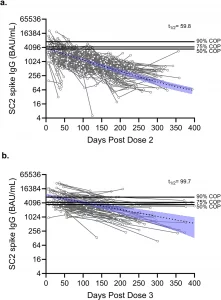A new longitudinal study tracked anti-wildtype SARS-CoV-2 spike IgG levels monthly in healthy adults from 2020 onwards, analysing responses after mRNA vaccinations and in the context of so-called hybrid immunity (vaccination + infection) (Figure 1).

Figure 1: Vaccine-induced SARS-CoV-2 IgG durability improves after three doses. Serum samples from participants after receipt of (a) two BNT162b2 doses (n = 221) and (b) an mRNA booster immunization (n = 113) were tested for IgG against SARS-CoV-2 (SC2) WT spike in an antigen-based multiplex immunoassay. Half-life (t1/2) was calculated using a one phase decay curve model (dotted line) with a plateau constraint at an IgG level associated with a serostatus threshold cutoff in this test, 14.4 BAU/mL (WHO Binding Antibody Units). The 95% confidence intervals are shown in the blue shaded areas. Horizontal black lines at 3500 BAU/mL (50% COP), 4300 BAU/mL (75% COP), and 7200 BAU/mL (90% COP) represent antibody thresholds previously reported as protective percentages during the first Omicron BA.1, BA.1.1 wave16. COP correlate of protection.
In individuals who received two doses of mRNA vaccine (with no infection), the antibody level declined with a half-life of ~59.8 days. In those who received a booster dose (third dose) but still no infection, the half-life improved to ~99.7 days. In the hybrid immunity group (vaccination + infection), the antibody half-life extended dramatically to ~241 days.
Using previously established antibody thresholds tied to protection, the authors modelled that people with hybrid immunity would maintain antibody levels above the ~75% protection correlate for approximately 283 days after the boosting event.
These findings indicate that:
- A booster dose significantly improves antibody durability relative to the primary two-dose series.
- The addition of infection (i.e., hybrid immunity) further strengthens and prolongs the antibody response.
- For younger, healthy adults (< 60 years of age), these kinetics may help inform optimal timing for future vaccine doses or booster strategies.
From this they have been able to conclude that immunity from just two vaccine doses wanes relatively quickly in terms of antibody levels. Furthermore, a booster makes a meaningful difference in durability. Finally, hybrid immunity offers the longest antibody persistence among the groups studied. Therefore, monitoring antibody kinetics can support decisions about when to schedule future vaccinations in healthy adult populations.
Journal article: M.D. Roe, et al., 2025. Estimating the decay of protective antibodies induced by SARS-CoV-2 mRNA vaccination and hybrid immunity. NPJ Viruses.
Summary by Stefan Botha










